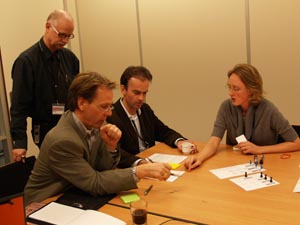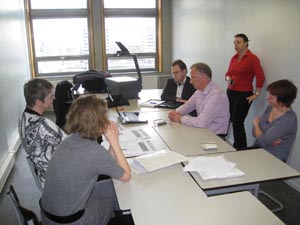Download our regular contributions to Control Magazine.
Issue 30, March 2012
Issue 29, January 2012
Issue 28, December 2011
Issue 27, November 2011
Issue 26, August 2011
Issue 25, July 2011
Issue 24, April 2011
Issue 23, February 2011
Issue 22, January 2011
Issue 21, November 2010
Issue 20, October 2010
Issue 18, June 2010
Issue 17, April 2010
Issue 16, January 2010
Control International Edition July 2011
Control International Edition March 2011
Control International Edition April 2010
Control International Edition August 2010
GATE final publication 2012
Results from the GATE research project
a 75 page overview (pfd 4.7 Mb)
GATE Magazine 2010
a 36-page overview of the GATE project (pdf 5.3 Mb)
Research themes:
Theme 1: Modeling the virtual World
Theme 2: Virtual characters
Theme 3: Interacting with the world
Theme 4: Learning with simulated worlds
Pilots:
Pilot Education Story Box
Pilot Education Carkit
Pilot Safety Crisis management
Pilot Healthcare Scottie
Pilot Healthcare Wiihabilitainment
Knowledge Transfer Projects:
Sound Design
CIGA
Agecis
CycART
VidART
Motion Controller
Compliance
Mobile Learning
Glengarry Glen Ross
CASSIB
EIS
Enriching Geo-Specific Terrain
Pedestrian and Vehicle Traffic Interactions
Semantic Building Blocks for Declarative Virtual World Creation
Computer Animation for Social Signals and Interactive Behaviors
Center for Advanced Gaming and Simulation
Department of Information and Computing Sciences
Utrecht University
P.O. Box 80089
3508 TB Utrecht
The Netherlands
Tel +31 30 2537088
![]() ICTRegie is a compact, independent organisation consisting of a Supervisory Board, an Advisory Council, a director and a bureau. The Minister of Economic Affairs, and the Minister of Education, Culture and Science bear the political responsibility for ICTRegie. The organisation is supported by the Netherlands Organisation for Scientific Research (NWO) and SenterNovem.
ICTRegie is a compact, independent organisation consisting of a Supervisory Board, an Advisory Council, a director and a bureau. The Minister of Economic Affairs, and the Minister of Education, Culture and Science bear the political responsibility for ICTRegie. The organisation is supported by the Netherlands Organisation for Scientific Research (NWO) and SenterNovem.
At this moment mayors have one major ways to train for possible future crisis situations: large table-top exercises. We came up with an additional way based upon serious gaming, brief, single-player and anonymous: "Play and improve the process". Crises change but a good process goes a long way.
To be able to advise on a game for strategic managers, like a mayor of a BT, we first established the learning goals for this group. This was done in 2009 together with a focus group consisting of subject matter experts. The learning goals chosen were ‘Setting priorities and making underpinned decisions -under time pressure'. For this game, to be a real addition to existing training methods there were specific conditions: (1) the game supports learning in max. 15 minutes; and (2) is a single-player game, to make it easier to arrange a training session and guarantee anonymity.
.jpg)
Teaser of the paper-based game - 2009/2010
Change a paper prototype into a mockup
To design a serious game, a game that allows players to learn, we work with three groups of experts in our team: 1. Game experts; to make a game entertaining, motivating and look good; 2. Educational experts; ensure that the learning goals can be reached by playing this game; 3. Domain experts, help the team with the content of the scenarios.
The team built a paper-based game first. The focus group could play a first round in November 2009. With some brief revisions we were able to take our game to a next level in 2010: a first digital version, a mock-up.
While the developers were looking for ways to translate the (paper) game-elements into digital components (mock-up), the educational experts set up an experiment. With 24 students from the Haagse Hogeschool (Integrale Veiligheidskunde) the paper-based game was played, to establish how the game affects the way in which people learn. Students filled out a digital questionnaire (before and after the game) about four elements of Self-Directed Learning (Control, use of Learning Strategies, Reflection, and use of Social environment) and some questions about motivation and self-efficacy. We found that where most tested elements did not change, there was (expected) improvement in the element Reflection.
The mock-up will be evaluated during the summer with a number of (deputy) mayors. The challenge for 2010 will be to prove that the effect found in the paper-based game, also applies to the digital version. All the feedback collected during the summer will be used to create the final game prototype. This prototype will also have more graphic details and meet the maximum possible of the learning goals and conditions as determined in the focus group meetings. In a final evaluation, probably late 2010 - early 2011, this game will be tested again with a group of mayors.
Having created a game that allows mayors to add another way of training to their curriculum, the team has only one wish left; Continue to develop the game by adding other learning goals and audiences, so that all Dutch Mayors and board members use this game to prepare for crises.
Pilot
Safety
Partners
Utrecht School of the Arts (HKU)
Thales
TNO
Key Publication
H. Stubbé (2009) Human factors in the process of game concept design. Poster at D-CIS Human Factors Event 2009
Contact details
Josine van de Ven, TNO
josine.vandeven(at)tno.nl
.jpg)
Operational levels of the Dutch crisis management organization

Focus group playing the paper-based game in november 2009

At the Haagse Hogeschool playing the game - March 2010
